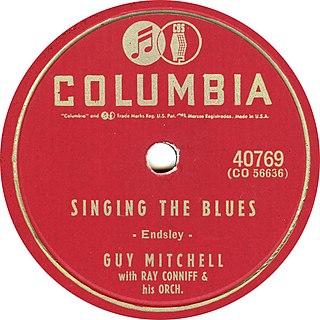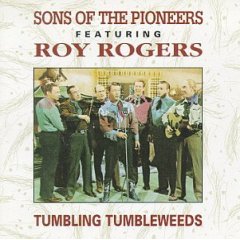Related Research Articles

"Secret Love" is a song composed by Sammy Fain (music) and Paul Francis Webster (lyrics) for Calamity Jane, a 1953 musical film in which it was introduced by Doris Day in the title role. Ranked as a number 1 hit for Day on both the Billboard and Cash Box, the song also afforded Day a number 1 hit in the UK. "Secret Love" has subsequently been recorded by a wide range of artists, becoming a C&W hit firstly for Slim Whitman and later for Freddy Fender, with the song also becoming an R&B hit for Billy Stewart, whose version also reached the top 40 as did Freddy Fender's. In the UK, "Secret Love" would become the career record of Kathy Kirby via her 1963 remake of the song. The melody bears a slight resemblance to the opening theme of Schubert's A-major piano sonata, D.664.

"Singing the Blues" is a popular song composed by Melvin Endsley and published in 1956. The highest-charting version was by Guy Mitchell and the first recording of the song was by Marty Robbins. It is not related to the 1920 jazz song "Singin' the Blues" recorded by Frank Trumbauer and Bix Beiderbecke in 1927.
"My Heart Cries for You" is a popular song, adapted by Carl Sigman and Percy Faith from an 18th-century French melody. The song has been recorded by many singers, the most successful of which was recorded by Guy Mitchell which reached No. 2 on the Billboard chart in 1951.

Alexander Emil Caiola was an American guitarist, composer and arranger, who spanned a variety of music genres including jazz, country, rock, and pop. He recorded over fifty albums and worked with some of the biggest names in music during the 20th century, including Elvis Presley, Ray Conniff, Ferrante & Teicher, Frank Sinatra, Percy Faith, Buddy Holly, Mitch Miller, and Tony Bennett.
"Have I Told You Lately That I Love You?" is a popular song written by Scotty Wiseman for the 1944 musical film, Sing, Neighbor, Sing and performed by Lulu Belle and Scotty. It was their greatest hit and one of the first country music songs to attract major attention in the pop music field. Although the song was featured in the movie, it was not released by Lulu Belle and Scotty until 1947. The first released version of this song was by Gene Autry in 1945.
The following is a discography of singles and albums recorded by American singer Frankie Laine.

"Indian Love Call" is a popular song from Rose-Marie, a 1924 operetta-style Broadway musical with music by Rudolf Friml and Herbert Stothart, and book and lyrics by Otto Harbach and Oscar Hammerstein II. Originally written for Mary Ellis, the song achieved continued popularity under other artists and has been called Friml's best-remembered work.

"Tumbling Tumbleweeds" is a Western music song composed by Bob Nolan, a founding member of the Sons of the Pioneers. Nolan wrote the song in the early 1930s while he was working as a caddy and living in Los Angeles. It was first recorded by the Sons of the Pioneers in 1934, and it became one of the most famous songs associated with the group. Originally titled "Tumbling Leaves", the song was reworked into the title "Tumbling Tumbleweeds" and into more widespread fame with the 1935 film of the same name starring Gene Autry. Members of the Western Writers of America chose it as one of the Top 100 Western songs of all time.

"Sweet Sue, Just You" is an American popular song of 1928, composed by Victor Young with lyrics by Will J. Harris. Popular versions in 1928 were by Earl Burtnett and by Ben Pollack.
Slim Whitman was an American singer-songwriter and guitarist. His first single, complete with trademark yodel "I'm Casting My Lasso Towards the Sky", appeared in 1949, and his first album, Slim Whitman Sings and Yodels, in 1954.
"Love Song of the Waterfall" is a song written by Bob Nolan. It was sung by Roy Rogers with the band Sons of the Pioneers, that Bob Nolan was a founding member of.
"China Doll" is a song written by Gerald Cannan and Kenny Cannan and originally recorded and released as a single by Slim Whitman.
"I'm a Fool" is a song written by Tommy Smith and originally recorded by Slim Whitman.
"An Amateur in Love" is a song co-written and originally recorded by Slim Whitman.
"North Wind" is a song written by Rod Morris and originally recorded and released as a single by Slim Whitman.
"My Heart Is Broken in Three" is a song written by Ray Glaser
"Singing Hills" is a song written by Mack David, Dick Sanford, and Sammy Mysels. As "The Singing Hills" it was very popular in 1940 with both Bing Crosby and Dick Todd (No.16) having hits with it.
"Bandera Waltz" is a song written by O. B. "Easy" Adams.
"I'm Casting My Lasso Towards the Sky" is a song written by Lee "Lasses" White and Jimmy Wakely.
"I'll Do as Much for You Someday" is a song written by Ed G. Nelson and Ed Nelson Jr.
References
- ↑ "Second Hand Songs" . Retrieved January 3, 2025.
- ↑ Whitburn, Joel (1986). Joel Whitburn's Pop Memories 1890-1954. Menomonee Falls, Wisconsin: Record Research Inc. p. 481. ISBN 0-89820-083-0.
- ↑ "Billboard". Nielsen Business Media, Inc. September 6, 1952 – via Google Books.
- ↑ "Slim Whitman - An Amateur In Love". Discogs. Retrieved 2023-03-14.
- ↑ "Billboard". Nielsen Business Media, Inc. March 23, 1959 – via Google Books.
- ↑ "The Marty Gold Orchestra & Chorus - By The Waters Of The Minnetonka" – via www.discogs.com.